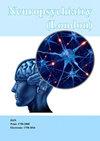Music Therapy Decreases Sadness and Increases Happiness in Alzheimer Patients: A Pilot Study
引用次数: 3
Abstract
Background Alzheimer’s disease (AD) is an irreversible neuro-degenerative dementia that causes emotional disorders such as anxiety and depression associated with low well-being and changes of state of mind. The aim of the present study was to assess the impact of a music therapy protocol as a tool to improve basic emotions in AD. Methods It is an analytical, experimental and prospective study. 30 Alzheimer patients of a mild level with an average age of 76,28 ± 4,6 years, participated in the study. Participants were randomly assigned either to a Control Group (n=15) or an Intervention Group (n=15) that received music therapy twice a week during three months (24 sessions). Due to some limitations of the work, it is only a pilot study. Results The data showed that no significant differences exist between pre and post values in the control group (that did not receive music therapy) in any basic emotion measure (fear, happiness, anger and sadness). However, in the intervention group (that received music therapy for three months) a significant improvement can be observed in all the emotions comparing pre and post intervention (more happiness and less fear, anger and sadness). Moreover, the result comparing control and intervention group between them in post-session showed that the patients of the intervention groups had a significant improvement in happiness and sadness after the application of music therapy. Conclusions An intervention using music therapy increases the state of happiness and decreases sadness in mild Alzheimer sufferers.音乐疗法减少阿尔茨海默病患者的悲伤和增加快乐:一项初步研究
阿尔茨海默病(AD)是一种不可逆的神经退行性痴呆,可导致焦虑和抑郁等情绪障碍,并伴有低幸福感和精神状态变化。本研究的目的是评估音乐治疗方案作为一种改善AD患者基本情绪的工具的影响。方法采用分析性、实验性和前瞻性研究相结合的方法。研究对象为轻度阿尔茨海默病患者30例,平均年龄76(28±4.6)岁。参与者被随机分配到对照组(n=15)或干预组(n=15),干预组在三个月内每周接受两次音乐治疗(24次)。由于工作的局限性,这只是一项初步研究。结果对照组(未接受音乐治疗)在任何基本情绪测量(恐惧、快乐、愤怒和悲伤)中,前后值均无显著差异。然而,在干预组(接受音乐治疗三个月)中,与干预前后相比,所有情绪都有了显著的改善(更多的快乐,更少的恐惧、愤怒和悲伤)。此外,对照组和干预组在治疗后的对比结果显示,干预组患者在应用音乐治疗后的快乐和悲伤方面均有显著改善。结论:音乐疗法能提高轻度阿尔茨海默病患者的幸福感,减少其悲伤感。
本文章由计算机程序翻译,如有差异,请以英文原文为准。
求助全文
约1分钟内获得全文
求助全文
来源期刊

Neuropsychiatry
NEUROSCIENCES-PSYCHIATRY
自引率
0.00%
发文量
0
审稿时长
>12 weeks
期刊介绍:
Neuropsychiatry is a bimonthly, peer reviewed, open access Journal aimed at exploring the latest breakthroughs in brain and behavior in order to enhance our current understanding of the disturbances in brain function. The Journal has established itself among the most authoritative journals in the field by publishing cutting-edge research in neuropsychiatry and also serves as a forum for discussing the latest advancements and problem statements in the field.
 求助内容:
求助内容: 应助结果提醒方式:
应助结果提醒方式:


